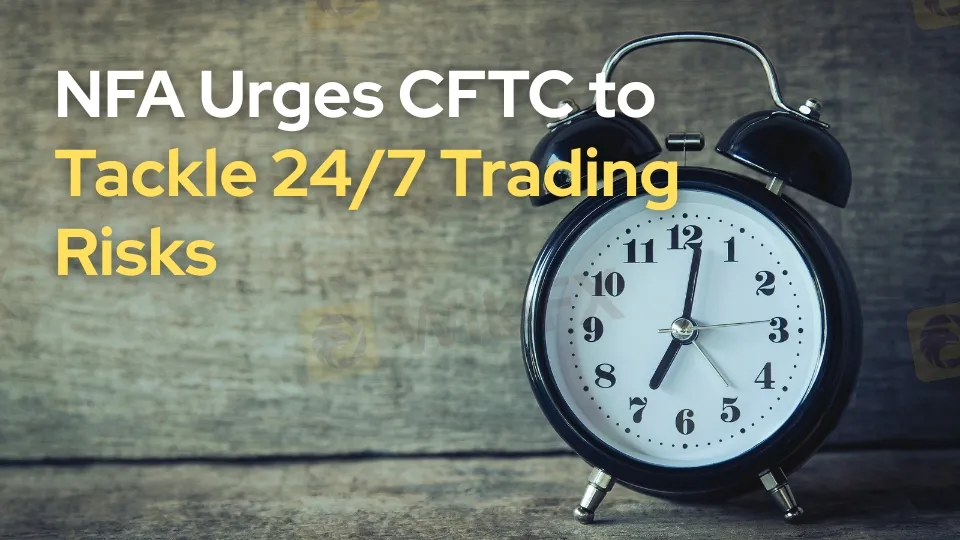NFA Urges CFTC to Address Risks in 24/7 Derivatives Trading
Abstract:The NFA advises the CFTC to reassess regulations and risk disclosures to safeguard retail investors amid the shift to 24/7 derivatives trading.

The National Futures Association (NFA) recently shared its thoughts with the Commodity Futures Trading Commission (CFTC) about the challenges of 24/7 trading on platforms like designated contract markets (DCMs) and swap execution facilities (SEFs). The NFA wants the CFTC to update its rules to better handle the risks that come with trading that never stops, especially for everyday investors and futures commission merchants (FCMs).
The NFA points out that constant trading brings new dangers that current CFTC rules might not cover well. For example, people who don‘t trade all the time could lose money or have their positions closed because of wild market swings over the weekend. Even those who trade often need clear warnings about the special risks of a market that’s always open. The NFA says everyone in the market, whether they trade a lot or a little, needs to know how round-the-clock trading could affect them.
One big issue the NFA raises is the term “business day” in the CFTC‘s Part 1 rules, which guide how FCMs work with customers. Right now, a business day doesn’t include weekends or holidays, which doesn‘t make sense for a market that runs 24/7. For instance, rules say FCMs must send daily trade updates, but they don’t have to do this on weekends because of the “next business day” wording. This could hide serious problems, like an FCM‘s money troubles if risks pile up when markets are open but it’s not a “business day.”

The “business day” term also messes with how FCMs figure out their capital. These calculations, which look at charges and deductions based on when things happen, dont line up with a market that never closes. Without changes, FCMs might struggle to follow rules and keep their finances clear on weekends or holidays.
The NFA also wants the CFTC to check if its risk management rules for FCMs are strong enough for 24/7 trading. Theyre worried about risks like credit issues, market ups, and downs, problems moving collateral, tech glitches like system updates, and other operational hiccups that could mess up trading platforms or block customer access. The NFA urges the CFTC to make sure current rules can handle these problems or update them to keep everyone safe.
To keep things under control, the NFA suggests a full review of Part 1 rules to make sure they work for nonstop trading. This means checking customer protections and making sure FCMs can stay open and honest, even on weekends. The goal is a set of rules that fits todays fast-moving markets while keeping investors safe.
As markets shift to being open all the time, the NFA‘s comments highlight the need to update rules to match. By fixing gaps in warnings, rule-following, and outdated terms, the CFTC can better shield everyday investors and FCMs in a 24/7 world. The NFA’s ideas aim to build a stronger, clearer market for everyone involved.

Read more

Hong Kong Approves Stablecoin Law to Boost Digital Finance
Hong Kong passes a stablecoin bill, launching a licensing regime for fiat-backed tokens to enhance digital finance and investor protection.

SEC Sues Unicoin, Executives for $100M Crypto Fraud Scheme
SEC charges Unicoin and executives with $100M fraud, alleging fake real estate backing and inflated token sale claims. Lawsuit seeks penalties.

CySEC Targets Unlicensed Forex and Crypto Brokers
CySEC blacklists unlicensed brokers like admiralmarket.net in the forex and crypto markets. Strict new rules impose hefty fines. Verify brokers to stay safe.

Is Dupoin a “100% Scam Broker”?
Is Dupoin a “100% Scam Broker”? A trader shared the experience trading with Dupoin. In today’s article, we will offer you a comprehensive review of this broker so that you can have a close overall look at Dupoin.
WikiFX Broker
Latest News
2025 FXPesa Latest Review
Aurum Markets- Opportunity or Trap? Let's uncover
Can these 10 Forex Brokers boost your money in 2025? Saxo, IB, eToro & More
OANDA Japan Deletes Inactive Accounts, Urges Re-registration
Explore the Unique features of Zerodha, BOI & HDFC Bank
WikiFX Broker Assessment Series | IronFX: Is It Trustworthy?
IG Group Set to Smash £1 billion Revenue Mark in FY2025
Stop Wasting Money on FX Courses! Learn Forex for Free- from Top Brokers
High Score, Fully Regulated: 3 Brokers You Can Trust in 2025
Traze Receives Authorization from UAE Securities Regulator
Rate Calc
